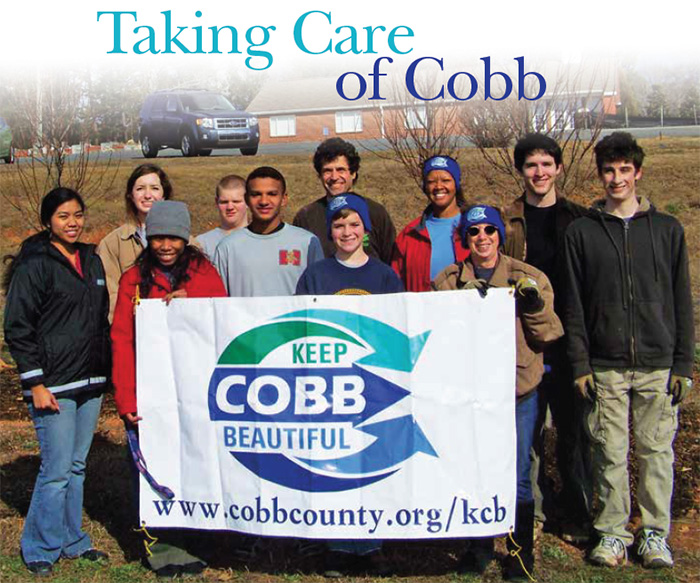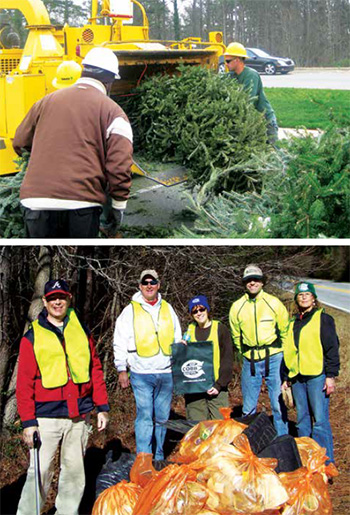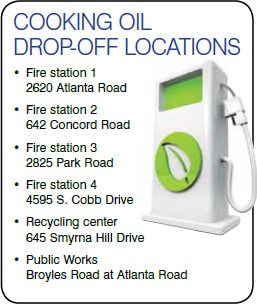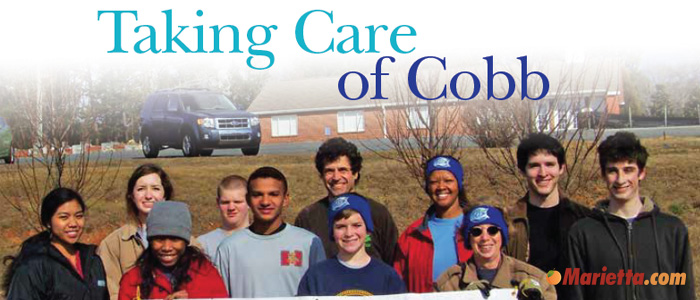In a world that’s ever growing and expanding, the need to create more sustainable lifestyles is imperative. Cobb County is well looked-after, with several organizations and programs that go above and beyond giving back to their community. These initiatives thrive on volunteer and community resident participation to make a more sustainable Cobb, so read on for some of the county’s major programs and get involved in beautifying your own backyard.

Keep Cobb Beautiful
In 2012, Keep Cobb Beautiful, Inc., an award-winning affiliate of Keep America Beautiful (KAB), a national, non-profit public education organization dedicated to improving waste handling practices in American communities, contributed a total of $1,119,074.81 to the county in volunteer hours, in-kind donations and implementations of cost-avoidance measures. The KCB program gives back to Cobb by hosting events, programs and services that promote environmental stewardship in the county.
“The ultimate goal of the KCB Program’s offerings is to promote an individual change of behavior towards the environment,” says Terrilyn Hannah, executive director of KCB. Education and advocacy for waste reduction and recycling, litter prevention, community greening and beautification are the goals of the program. “Keep Cobb Beautiful is fortunate to have an abundance of resources,” says Hannah. “Of these resources, our volunteers are the most vital and appreciated. In 2012, KCB utilized volunteers for more than 30,000 hours in our many programs. It is through their time, energy, enthusiasm and areas of expertise that Keep Cobb Beautiful has been able to reach the community for almost 30 years.”
 The program has a full calendar of scheduled events and outreach cleanups planned for 2014, including tree plantings starting as early as January, a Christmas tree recycling event, the Great American Cleanup, Neighborhood Sweeps and the Rivers Alive fall stream cleanup. “As the program enters 30 years strong, the board and staff of KCB will be challenged with sustaining existing programs, and expanding and introducing new/other ones to meet needs of the Cobb County community,” says Hannah. “Some near future goals include, but are not limited to, implementing the new ‘Cool Business’ shade tree program, increasing the number of recycle drop-off spots and providing at least one Community Recycling Center event per County Commission district each year.”
The program has a full calendar of scheduled events and outreach cleanups planned for 2014, including tree plantings starting as early as January, a Christmas tree recycling event, the Great American Cleanup, Neighborhood Sweeps and the Rivers Alive fall stream cleanup. “As the program enters 30 years strong, the board and staff of KCB will be challenged with sustaining existing programs, and expanding and introducing new/other ones to meet needs of the Cobb County community,” says Hannah. “Some near future goals include, but are not limited to, implementing the new ‘Cool Business’ shade tree program, increasing the number of recycle drop-off spots and providing at least one Community Recycling Center event per County Commission district each year.”
Cobb County Watershed Stewardship Program
Offering free outreach programs for classrooms and community groups in Cobb County, the Watershed Stewardship Program’s hands-on programs promote respect for the environment by educating participants about the connections between behavior and water quality. “Our focus is on ecological literacy, including topics such as pollution prevention, biodiversity and environmental health,” says Environmental Programs Specialist Mike Kahle. “We provide education on issues impacting local water quality, [in order to] foster good habits and responsible behavior and cultivate an appreciation and a connection to our natural environment.”
During the 2012–2013 reporting year, 15,911 community members participated in the Watershed Stewardship Program, logging 4,144 hours of volunteer service. These community programs reached 3,603 participants, and 10,761 students took part in free school programs. “We provide the tools and training for our service projects, which focus on preventing non-point source pollution from entering our waterways, and eventually our sources of drinking water,” says Kahle. “These projects include storm drain marking, waterway cleanups, stream bank stabilization and maintaining a demonstration rain garden. We also coordinate the Georgia Adopt-a-Stream programs here in Cobb County, and work in partnership with more than 30 local and regional programs, businesses and government agencies to better serve the population.”
In 2014, the Watershed Stewardship Program plans to focus largely on bacteria reduction education. They plan to undergo a partner project with the Metro North Georgia Water Planning District to launch a PSA video contest to increase awareness among high school students, particularly on the consequences of pouring kitchen grease down sink drains. They will also ramp up their Pick It Up program to help reduce pet waste litter. “Both stewardship practices are quick, easy ways to help ensure our streams and neighborhoods are healthy,” says Kahle.
Smyrna’s Biodiesel Plant
In 2012, Smyrna opened a biodiesel plant with the goal of fueling the city’s fleet of vehicles with used cooking oil. The plant was paid for by a $208,000 grant from the $3.2 billion Energy Efficiency and Conservation Block Grant Program, under the umbrella of the U.S. Department of Energy. The grant is meant to “deploy the cheapest, cleanest and most reliable energy technologies we have,” according to the department’s website, and that is just what Smyrna has begun to accomplish.
The program’s goals were to first reduce the city’s consumption of fossil fuels (diesel), reduce the city’s fuel cost and keep the air cleaner by reducing greenhouse fossil fuel emissions in Smyrna. Their objective is to reduce diesel consumption and emissions by 25 percent by 2025 while saving approximately $25,000 a year in fuel costs.
The city has a hefty supply of raw materials after the program’s second Thanksgiving. Residents and restaurants can donate used cooking oil at six collection stations around the city, which also provide empty plastic jugs. Prior to Thanksgiving 2012, the city notified residents of the collection efforts by social media and its online newsletter, which helped them to stockpile 400 gallons of oil before the plant went live Nov. 28. For 2013, donations from the holiday are still coming in.
The advantages of this program for the city are numerous: reducing fossil fuel consumption costs and emissions, enhancing the maintenance and extending the life of city service vehicles, reducing the city’s purchase of diesel and providing an alternate fuel source, as well as giving the city a way to self-sufficiently produce fuel during shortages and helping to keep the sewers cleaner and free of improperly disposed cooking oil.
Ann Kirk, director of Keep Smyrna Beautiful, says they are just getting ready to make a new batch of biodiesel, but they’ve processed 600 gallons so far, with 800 more ready to process. They want to start with one city vehicle to better test how the project would go, and that one truck is already running off the biodiesel at B100, or 100 percent biodiesel. Kirk and the Keep Smyrna Beautiful team hope to soon get restaurants involved by allowing them to donate their used cooking oil.
 Collection areas around the city as well as jugs at the recycling center keep residents from pouring oil down their drains. When residents use large quantities of oil, such as for frying turkeys, it’s cumbersome to dispose of it properly. The service the city can offer willing restaurants is a barrel for oil at restaurant or institutions that will be picked up at no charge. “There are some people actually paying for removal of waste oil and we would love to service those people,” says Kirk. “I think a lot of the positive effect has just been raising awareness, but it has created a source for us to get rid of what would have otherwise have been a pollutant. We don’t want this going down the drains in homes and apartment buildings because it clogs up the sewers. It helps keep us energy-independent and is much more environmentally-friendly than tetro diesel.”
Collection areas around the city as well as jugs at the recycling center keep residents from pouring oil down their drains. When residents use large quantities of oil, such as for frying turkeys, it’s cumbersome to dispose of it properly. The service the city can offer willing restaurants is a barrel for oil at restaurant or institutions that will be picked up at no charge. “There are some people actually paying for removal of waste oil and we would love to service those people,” says Kirk. “I think a lot of the positive effect has just been raising awareness, but it has created a source for us to get rid of what would have otherwise have been a pollutant. We don’t want this going down the drains in homes and apartment buildings because it clogs up the sewers. It helps keep us energy-independent and is much more environmentally-friendly than tetro diesel.”
They hope eventually to have all the city’s service vehicles running on biodiesel and to have all of Cobb County involved in the eco-friendly fuel process. “I’m not sure that [residents of Cobb are] all that aware of it,” says Kirk. “I know that our residents and citizens in Smyrna are happy with it. We will accept oil from all over the county. We would hope that people all over the county would feel free to bring their oil to us. We would love to have it.”

















